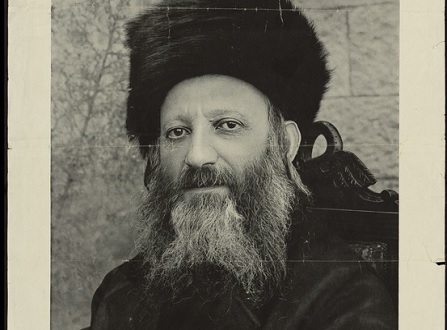Rabbi Abraham Isaac Kook
Rabbi Abraham Isaac Hacohen Kook (HaRaAYaH, 1865–1935) was the first Ashkenazi Chief Rabbi of the Land of Israel. He is considered one of the most original and influential Jewish religious thinkers of the 20th century as well as one of the fathers of religious Zionism.
Rabbi Kook was born in 1865 in the town of Grīva in Latvia to a Lithuanian father and a mother whose family were followers of Chabad Hasidism. From childhood, he absorbed various traditions that may have influenced his personal philosophy, which fused different methods and the quest for “harmony” in a world of contrasts. At nineteen, he was ordained by Rabbi Yechiel Michel Epstein (author of Arukh HaShulḥan). He studied at the renowned Volozhin yeshiva and became a disciple of the head of the yeshiva, Rabbi Naftali Zvi Yehuda Berlin (Netziv). After his marriage, he served from 1888 until 1904 as a rabbi in the towns of Zaumel (Žeimelis, in Northern Lithuania) and Višķi in Latvia. It was during this time that he began writing books and articles on matters of halakha (Jewish religious law), Jewish thought, and Talmudic commentary, some of which were published only many years after his death. He engaged in the study of Kabbalah with the well-known Kabbalist Rabbi Shlomo Elyashiv.
In 1904, Rabbi Kook, who was an avid Zionist, accepted an offer to serve as Rabbi of the city of Jaffa and the new farming settlements, and arrived in the Land of Israel on the 28th of Iyar that same year. During his time in Jaffa, he continued to write books and even started a yeshiva next door to his home in Neve Tzedek. In 1913, Rabbi Kook headed a delegation of rabbis to the rural settlements in order to strengthen Jewish religious life there. In 1909–1910, Rabbi Kook strongly supported a “heter meḥira,” a halakhic mechanism allowing for the continuation of agricultural work during the sabbatical seventh year. This sanction, while endearing Rabbi Kook to the secular pioneers, attracted the lasting ire of Old Yishuv zealots. While on a visit to Europe, the outbreak of World War I forced Rabbi Kook to spend three years in London. While there, he served as rabbi of a synagogue and was active in promoting the Balfour Declaration.
In 1919, following his return, Rabbi Kook was appointed Chief Rabbi of Jerusalem. Two years later, with the establishment of the Chief Rabbinate of the Land of Israel, he was appointed the first Ashkenazi Chief Rabbi, alongside Rabbi Yaakov Meir, who served as the Sephardi Chief Rabbi, also known as the Rishon Lezion. In 1924, Rabbi Kook established the Merkaz Harav yeshiva in Jerusalem. While serving as Chief Rabbi, Rabbi Kook was active in public affairs, such as lobbying the British Mandate institutions to allow Jewish immigration and for the Jews’ right to oversee the Western Wall. He also intervened in internal Jewish conflicts, for example in the controversy surrounding the assassination of the political leader Haim Arlosoroff in 1933. His position on behalf of the defendant, Avraham Stavsky, was widely criticized by the establishment.
Rabbi Kook was a prolific and innovative author and sometimes even a radical thinker. He saw the need to address modernity’s challenges by identifying its positive aspects. The secular pioneers, in his view, were ethical people advancing a divine plan of redemption. He appreciated their positive qualities, which he perceived as lacking among the religious sectors. At the same time, he was an unwavering believer in and explicator of halakha as well as a Kabbalist and mystic. Rabbi Kook advocated the establishment of a “Torah of the Land of Israel” that would combine halakha and aggadah (Talmudic folklore and wisdom). Alongside permissive rulings such as heter meḥira, he also held more conservative views, such as his opposition to women’s suffrage.




